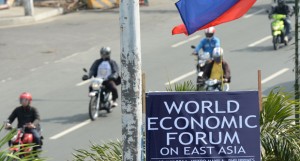Under int’l scrutiny: Is PH reform irreversible?
(Second of two parts)

Motorists speed past a sinage of the World Economic Forum (WEF) on East Asia displayed along a street near the airport in Manila on May 21, 2014. AFP FILE PHOTO
As the World Economic Forum (WEF) Summit on East Asia debuts in the Philippines Wednesday to tackle the hottest global, regional and industry agendas, it brings to international scrutiny whether the turnaround that the country has seen in recent years is irreversible.
The clear-cut consensus is that a lot has been accomplished under President Aquino in improving governance, thus, raising the bar for his successor. Perception turned favorable as soon as Aquino made “Daang Matuwid” (righteous path) his vision and mission, rekindling investor and consumer confidence.
But at the grassroots level, a lot more needs to be done and the pork barrel scam only proves that the battle against corruption will be long and protracted.
It also needs more people and institutions to champion the cause beyond the term of the incumbent President. After all, the next presidential election is happening in two years, inevitably casting uncertainties on whether the country’s next CEO—whoever he or she may be—will carry the same torch.
Elaine Dezenski, head of Partnering Against Corruption Initiative (Paci) at WEF, and one of the resource persons in the session “Transparency for Growth and Inclusion” on Thursday, said in an interview with the Inquirer that hopes in eradicating corruption cannot just rest with whoever was in power at a particular moment in time.
At every level
“An environment free of corruption depends not just on leadership at the top, but leadership that sets the right tone that permeates the way things are done at every level,” she said, when asked how reform reversals could be avoided with the looming change in leadership in the Philippines in 2016.
“The institutions of governance in any society must be strong enough to withstand changes in political leadership, because transparency and ethical conduct are deeply embedded,” Dezenski said.
Paci is a global, multi-industry, multistakeholder anticorruption initiative set up to raise business standards and to contribute to a competitive, transparent, accountable and ethical business society.
Recognize Aquino’s efforts
At the WEF Annual Meeting earlier this year, the Paci Vanguard—the CEO community of global business leaders committed to achieving a world free of corruption—was launched. Dezenski said this had become so influential as it is through this type of advocacy and transparency that anticorruption is embedded and institutionalized.
“Such leadership that is lasting and engrained is what’s more important than the changes that occur with the election cycle,” she said.
Across the region, Dezenski noted that efforts to curb corruption in the region had been “genuine and conscientious.” However, she said it should be appreciated that progress on these difficult challenges would take time. She said some countries may have had a head start on anticorruption activities and have thus seen results, citing Singapore and Hong Kong as the two economies in the region that have fairly sophisticated anticorruption institutions that ensure positive outcomes for the broader community simply because they had been at it for much longer.
“Corruption works differently in different political economies and cultures, and effective reforms must address local specificities. We ought to recognize the efforts of President Aquino in advancing this issue in the Philippines,” she said.
Fantastic
Paci believes that a multistakeholder approach is essential to eradicating corruption.
“Fantastic” is how Jaspal Singh Bindra, group executive director for Asia at Standard Chartered Bank, described Aquino’s anticorruption efforts. He said the current heads of state of the Philippines and Indonesia were two very good examples of top political leaders making progress in addressing corruption and leading their economies to achieve above-trend economic growth rates.
Civil society plays a “critically important role” in promoting transparency and good governance. Many entities ranging from international organizations like the UN Office of Drugs and Crime to Transparency International and other nongovernment organizations all do excellent work in anticorruption awareness-raising, standard setting and prevention, Dezenski said.
No going back to old ways

The next presidential election is happening in two years, inevitably casting uncertainties on whether the country’s next CEO—whoever he or she may be—will carry the same torch.
Stanchart’s Bindra is not too worried that the 2016 elections would spoil the momentum for the Philippines. Having raised the bar for this successor, he believes that Filipinos would not accept anything less.
“If you have public support for it, it’s very difficult to undo it in a democratic setup. I think the public will not permit going back to old days,” he said, adding that there may be some degree of change but not to the extent of unwinding everything.
Social media is likewise seen generating great potential in the fight to bring about greater transparency and accountability in the public and private sectors. “Importantly, it’s a tool that is harnessed well by youth all over the world and these young people will one day—if they don’t already—bring about different standards when it comes to ethics and transparency to their jobs in government, business or civil society alike. It’s important that established institutions appreciate the power of social media for good and effectively integrate it into the work that they do against corruption,” Dezenski said.
Moving forward, the Philippines can find hope in its vibrant civil society, which has, after all, already succeeded in ousting two Presidents (Ferdinand Marcos and Joseph Estrada). Another former President, Gloria Macapagal-Arroyo, is now facing charges of plunder.
Freedom of info
Asked whether she believes freedom of information (FOI) legislations should be pushed across the region, Dezenski said she believed it was part of the solution, but not the cure-all pill.
“Governments and businesses serve their constituents and this means that citizens and customers alike should be well informed about the products and services they receive, and the policies and decisions that affect them as community members or consumers. Freedom of information goes part of the way to ensuring that such information is available to people. It is not the only thing that can support the eradication of corruption but it goes part of the way to ensuring accountability and transparency,” she said.
“Whether or not it is right for every environment is a different question because corruption is a dynamic that is culturally nuanced. Some anticorruption strategies might work in one circumstance while they might not in other instances. As such, it’s not really possible to say that FOI legislation will have the same impact in every scenario across a region as diverse as Southeast Asia,” she added.
New growth engines
Apart from the governance agenda, this summit is an opportunity to discuss new engines of growth for the Philippines aside from overseas remittances from exported labor and the business process outsourcing industry.
Hopes were high on big-ticket infrastructure development given the potential multiplier effect on the economy and the large backlog which constrains future growth, but government’s execution was slower than anticipated.
Tourism has great potential as the country’s beaches and natural landscape are breathtaking, but the country’s absorptive capacity is also tied to connectivity and infrastructure.
Tourism Secretary Ramon Jimenez pointed out that being an archipelago which is geographically separate from Indo-China, it’s physically impossible for foreign tourists to reach the country except by air travel.
A revival of the manufacturing sector also offers hope, especially with rising wages in China and the latter’s territorial dispute with Japan. There are indications from industrial zone developers that appetite is rising among the Japanese as well as Koreans to set up factories or expand their existing ones locally.
Foreign investors lining up
We definitely need all the foreign direct investments (FDI), especially in the manufacturing sector as this is key to faster job creation. This East Asia Summit 2014—which will gather over 600 policymakers, business and civic leaders, and social entrepreneurs in the Makati central business district—is a fertile meeting ground for potential partnerships.
In Davos, Aquino said that gone were the days when the country begged for investments and that it’s investors who are now lining up to be accommodated. We hope to see such interest translating into FDIs into labor-intensive sectors such as manufacturing and agribusinesses.
Stanchart’s Bindra said the key would be to achieve the right balance between the services sector, which creates more high-value jobs, and manufacturing, which attracts more FDIs. “In some ways, the Philippines has got the balance right,” he said.
For Philippine corporate participants, it’s also a way to broaden their networks as they scout for opportunities in overseas investments. We have never seen as many outbound-looking conglomerates as we do now, and it’s good because it opens up new markets, encourages innovation and makes them more efficient in their supply chains.
On Thursday, Ayala Corp. CEO Jaime Augusto Zobel de Ayala II will be a panelist at the “Innovating for Global Citizenship” session. We know Zobel to be a firm believer that the Philippines has what it takes to play on “Team A” and to stop acting and thinking like it’s still with “Team B.”
AEC still a mystery
Finally, we hope that this East Asia Summit can be an eye-opener to the imperatives for Asean regional integration. There’s a session on Friday that will tackle the infrastructure needed to accelerate regional integration. Tycoon Enrique Razon Jr., chief of port operator International Container Terminal Services Inc. and one of the few Philippine-based businessmen who have established truly global businesses, is a panelist at this session, along with Stephen Groff, vice president at Asian Development Bank.
For many people on the ground, the creation of an Asean Economic Community (AEC) by 2015 is still a big mystery. Apart from the general concept of allowing free movement of goods, services, funds and investments, it remains a big question mark, especially on how it will affect small and medium enterprises (SMEs). Most large corporations are ready for AEC 2015 which is possibly the biggest game-changer in the region in the years ahead, but SMEs and the general citizenry have much more to learn.
Big brainstorming
Expect the next three days to be a big brainstorming activity about global, regional and industry agenda most relevant to this part of the world. As WEF founder and executive chair Klaus Schwab said: “We live in a fast-moving, highly interconnected world, and our existing systems, structures and formal institutions no longer suffice. Pressing global problems can arise quickly and without warning. At the same time, new and unprecedented opportunities for global growth and positive change are emerging and must be harnessed for the future of humanity.”
“Among international institutions, the forum is an impartial platform for transforming dialogue into insights, insights into agenda, and agenda into action. This provides the practical basis for our mission: to improve the state of the world by serving as a trusted partner of all the stakeholders of global society as they embark upon transformation processes in response to the profound economic, social and political changes sweeping our world,” he added.
(Editor’s note: The author is a senior business journalist and is among WEF’s Young Global Leader Class of 2014. Her opinions do not reflect WEF’s.)
FIRST PART
